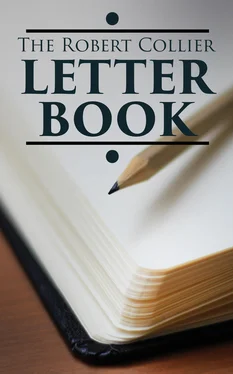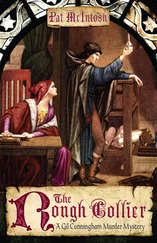You may not be trying to start a new religion, but you do want action of some kind. And to get action, you need to arouse emotion on the part of your reader. You may convince his intellect that the thing you want him to do is right and is for his best advantage, but until you arouse in him an urgent desire to do it, until you make him feel that whatever effort it requires is of no account compared with the satisfaction it will bring him, your letter is lacking in its most important essential. It may have everything else, but if it lacks that faculty of arousing the right feeling, you might as well throw it away. It will never make you money.
Fifteen years ago there was a young fellow in a small Connecticut town with a book—and an idea. The book had been written for serious-minded men, to help show them the way to success. But letters and advertising telling of this marvelous secret of power had left their readers cold—so cold that the original publisher had failed. The young fellow had been his bookkeeper, and had bought the plates and stock at the sale of the publisher’s effects.
You see, this young fellow had an idea he could sell that book. He believed that a mere description of its contents, such as had been used in the letters and ads, was not enough, that the important thing was to arouse the reader’s desire through an appeal to his ambition. He had only $200 left, but he decided to gamble those $200 on selling the book.
To make a long story short, he did it. He spent his $200, and from them he got $2,000 worth of direct orders by mail! That $2,000 was the start of a small fortune. He promptly spent every cent of it in selling more books, pyramiding his receipts like a stock gambler does his winnings. In the fifteen years that have elapsed since then, that young man has sold more than $2,000,000 worth of books. His name is A. L. Pelton. The book was "Power of Will." And he sold his two millions, as he did his two thousands, by making his appeal—not merely to the intellect, but to the emotions.
And his case is typical of every great mail success. What sold the "Book of Etiquette?" It had been gathering dust on the shelves of Doubleday, Page & Co.’s stock room for ten to fifteen years when Nelson Doubleday suddenly brought it to life and sold a million copies. What caused the sudden demand? Not, you may be sure, any wave of culture or politeness sweeping over the nation, but simply the fear aroused in the readers of Doubleday’s letters and advertisements that some unconscious gaucherie might cause them embarrassment.
Why do people buy reducing belts, face creams, hair tonics? Why do they diet and go through arduous exercises? Not because their reason tells them they need these things, still less because they like them—but because their emotion of vanity impels them!
Appeal to the reason, by all means. Give people a logical excuse for buying that they can tell to their friends and use to salve their own consciences. But if you want to sell goods, if you want action of any kind, base your real urge upon some primary emotion!
CHAPTER 3
GETTING NEWS INTEREST INTO YOUR LETTER
Table of Contents
What the world wants, and has wanted since the beginning, is news— something to flag its jaded interest, something to stir its emotions.
Tell a man something new and you have his attention. Give it a personal twist or show its relation to his business and you have his interest.
Do you know how Wells’ "Outline of History" was first put across? On its news value! "The Oldest Man in the World," "Was This the Flood of the Biblical Story" "The Finding of Moses," and so on. Newspaper headlines, all of them. News interest in every one of them. Rich man, poor man, beggar man, thief—all stop to read if you can put news interest into your letters.
"When the Rattlesnake Struck!" Can’t you see yourself reading on to see what happened? Well, that is what thousands of others did every time that headline was used. It sold hundreds of thousands of O. Henry books.
"Will a Yellow King Rule the World ?" Which one of us would not be startled enough by such a headline to read on and see if there was any reason to fear that such a thing might ever really happen?
"What is the Unpardonable Sin in all Nature?" Can you imagine any reader so biased as not to go on at least a few lines further to find the answer to that question? And if you can lead him on those few lines, it is your own fault if you can not make your story so interesting that it will carry him right down to the last line and the order blank or card that follows it.
A business man is no different from any other kind. Watch him on his way to the office. Compare the time he gives the financial and business news with the way he eagerly devours the details of the latest murder or scandal, or the attention he gives the "sports" page. He wants news interest. He will get it in his business as far as he can, but if it is not there, he will look outside his business for it.
So if you want his attention, go after it as the newspaper paragrapher does. He knows he has to compete with a thousand other distractions, so he studies his reader and then presents first that side of his story most likely to attract the reader’s interest.
You have to compete in the same way for your reader’s attention. He is not looking for your letter. He has a thousand and one other things more important to him to occupy his mind. Why should he divert his attention from them to plow through pages of type about you or your projects?
You have, we shall assume, decided upon the emotion your letter must arouse in your reader to get him to do as you want. You know that every man is constantly holding a mental conversation with himself, the burden of which is his own interests—his business, his loved ones, his advancement. And you have tried to chime in on that conversation with something that fits in with his thoughts. But some propositions do not lend themselves readily to this. What are you to do then? Look for news value! Look for something in or about your proposition of such news interest that it will divert the reader’s mind temporarily from his own affairs, then bring it back by showing how your proposition fits in with those affairs or is necessary to their successful accomplishment. How are you to do it?
Perhaps the best way to explain that is to show a few examples of the way it has been successfully done. Here are some typical openings which get the reader’s attention and lead logically on to a description of your proposition:
Do you know what was Socrates’ chief characteristic? It was his pertinacious curiosity, his desire to know the why and the wherefore of everything, his questing for fundamental reasons.
It was this curiosity that helped make him represent the highest achievement of Greek civilization. It is that same questing for fundamentals that makes the Bland Advertising Agency so invaluable when a new product is to be introduced, a new field opened, and a new method tried.
* * * * *
In the city of Baghdad lived Hakeem, the Wise One, and many there were who came to him for counsel, which he gave freely to all, asking nothing in return. One day there came to him a young man, who had spent much but got little, and asked: "Tell me, Wise One, what shall I do to receive the most for that which I spend?"
Hakeem answered: "A thing that is bought or sold has no value unless it contains that which cannot be bought or sold. Look for the Priceless Ingredient."
"But what is this Priceless Ingredient?" persisted the young man. Spoke then the Wise One. "My son, the Priceless Ingredient of every product in the market place is the honor and integrity of him who made it. Consider his name before you buy."
For 25 years, Squibbs has been making, etc.
Читать дальше











